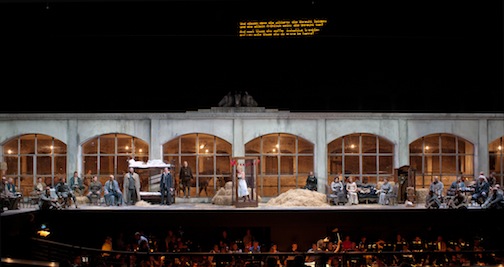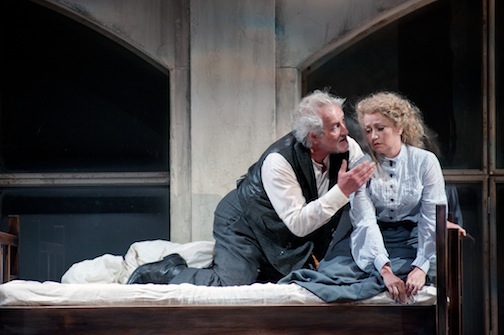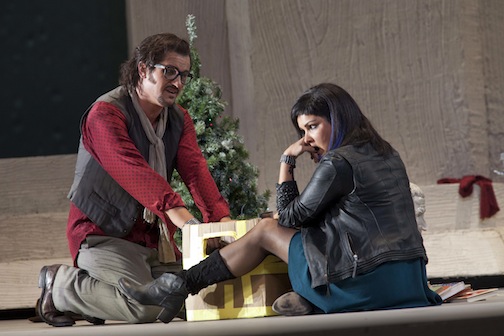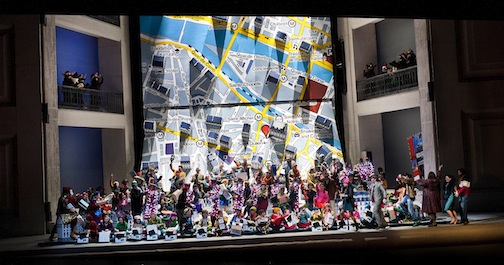Salzburg, the birthplace of Wolfgang Amadeus Mozart, has treated its most illustrious son far better in death that it did during life. Indeed, through shrewd public relations and astute marketing, the city has become a magnet for music lovers and the summer festival with its impeccable musical standards represents the Olympus of all festivals. It also has the dubious distinction of having the highest ticket prices.
This year was the inaugural season of the newly appointed festival director, Alexander Pereira, who relocated from the Zurich Opera. At the outset of his tenure, he stated, "I am convinced that a festival should be unique each year." The mainstay of the Salzburg festival remains the operatic productions and Pereira revolutionized this format. No longer will previous productions be repeated. The plan is to have new productions at each festival. Even more impressive is Pereira's intention of staging annually a newly commissioned opera. Funding for this ambitious undertaking has already been secured until 2016. György Kurtág, Hungary's leading composer, will premiere a new composition at next year's festival.
Since there was inadequate time for a new commission during the current festival, Pereira staged Bernd Alois Zimmermann's epic opera, Die Soldaten. Acknowledged as one of the major operatic compositions of the last 50 years, it has been very infrequently performed because of its notoriously difficult vocal and orchestral demands as well as the complex staging. Pereira selected Latvian stage and set director, Alvis Hermanis, who pulled out all the stops to make this landmark production the absolute highlight of the current festival.
Hermanis set the action during the First World War. The opera portrays the degradation of the main character, Marie, the naive daughter of a working class family who takes up with the young French nobleman, Desportes, believing that he will marry her. She abandons her fiancée, the draper Stolzius with whom she is still in love. Maria's father, Wesener, initially warns her against her liaison with Desportes but then relents and even encourages her, believing that Marie could marry above her class. Desportes cynically exploits Marie and then rapidly discards her. Marie gradually becomes the soldier's whore, flitting from one soldier to another. Stolzius gets his revenge by poisoning Desportes. However this was only a pyrrhic victory since Stolzius also poisons himself. Marie eventually ends up in the gutter where she begs for a morsel of bread from her father who fails to recognize her.
The opera was performed in the former Felsenreitschule (Rock Riding School), a magnificent theater carved out of the rocks, which was used in the 1600s as a riding school. The staging comprised nine large window arches effectively dividing the huge stage into compartments. The background behind these windows depicted the horrors of war. Dissolute soldiers and other interested and disinterested onlookers viewed the proceedings. They often wandered around aimlessly, lay on beds, drank alcohol and cajoled with women. Seven horses paraded up and down, which added a nice touch considering the previous function of this theater.

Projected onto the stage were early pornographic daguerreotypes. Thus both the audience upfront and the soldiers behind the windows become voyeurs. Is this pornography or art? It was left to the audience to decide. On several occasions, the action calls for several scenes to be set simultaneously and the ingenious staging brilliantly exploited and allowed for this.
With the horses came plenty of hay and much of the action was played in a vertical glass cabinet box filled with hay. In one three-part tableau, there was Stolius's mother pleading with her son to forget Marie. Adjacent was Wesener's aged mother singing a folk song and in the third scene were Marie and Desportes having their initial sexual encounter in the cabinet box. It was also here that Marie was subsequently raped by Desportes's gamekeeper. In another dramatic moment, Maria was entrapped alone in the glass box struggling to escape her fate but of no avail.
Another pivotal scene saw an image of Marie negotiating a tightrope and walking across the giant stage accompanied by an organ interlude. Did this symbolize or imply her impending danger and irrevocable downward spiral? In a final remarkable twist at the end of the opera, one saw Marie high up on the stage clasping stone images of three horses from the Riding school.
The role of Maria was played by American soprano Laura Aikin, who summoned all her resources to give an outstanding singing and acting portrayal of the complex role. Other memorable performances in the huge cast were given by baritone Alfred Muff as her father. Bass-baritone Tomasz Konieczny was also most effective as Stolzius as was tenor Daniel Brenna in the role of the despicable Desportes. Another notable performance was that of veteran soprano Gabriela Beňačková as the Countess who invited Maria to live with her to prevent her son from forming too close a liaison with the soldier's whore.

In the pit was the Vienna Philharmonic Orchestra, augmented on both side walls by massive percussion forces which included organ, piano, harpsichord and harps. Full marks go to conductor Ingo Metzmacher who held these gigantic forces together and led a scintillating reading of the complex 12-tone score.
Puccini has been given short thrift throughout the history of the Salzburg Festival. To date, his only operas to have been performed have been Tosca and Turandot. Pereira staged La Boheme, which proved to be the most popular opera at the current festival. This was no doubt related to the presence of Russian superstar soprano Anna Netrebko who portrayed the hapless Mimi. The crowds were so dense that it was difficult to cross the road separating the non-fashionable side of the Grosses Festspielhaus (Great Festival Hall) crammed with gaping onlookers from the fashionable side with the ticket holders resplendent in fancy evening attire.
Netrebko did not disappoint and gave a lustrous, totally committed portrayal of the doomed Mimi. Her vocal control in the pianissimo passages was quite remarkable. Tenor Piotr Beczala as her Rodolfo also gave an impassioned performance as did Massimo Cavalletti in the role of Marcello and soprano Nino Machaidze as Musetta. Bass Carlo Colombara as Colline made a great show of his one great aria when he is about to pawn his coat.

Daniele Gatti propelled the Vienna Philharmonic with much vigor. This was orchestral playing at the highest level. This production, directed by Damiano Michieletto was set in contemporary Paris. In many instances maps of the city were prominently displayed together with small buildings. The Bohemian garret scene utilized the entire stage of the Grosses Festspielhaus and lost its intimacy. The Latin Quarter scene was crowded with wealthy Christmas shoppers which dramatically contrasted with the poverty of the opening scene and that of Act 3 set in the outskirts of Paris at a road house selling snacks with the coming and going of workers, trash collectors and women of the night.

A nice touch was an invisible hand that scrawled the name of Mini on the fogged and steamed up window splattered with raindrops in the final scene. This was then blotted out implying Mimi's imminent demise. However this production was certainly not on par with the magnificent singing and orchestral playing which made this Boheme such a resounding success.
Opera only represents one of the art forms of the Festival, which also includes drama, solo recitals, visiting orchestras, and chamber music events. The new director also introduced a new series of sacred music, which will highlight different faiths in forthcoming festivals. This year, it was Judaism and the Israel Philharmonic under Zubin Mehta played a prominent part. Unfortunately I was not in Salzburg for their concerts but the IPO garlanded rave international reviews.
That incomparable pianist Maurizio Pollini gave a magisterial, cool but unemotional Apollonian account of Beethoven's last three piano sonatas. His playing was characterized by intellectual and technical brilliance and mathematical precision but was somewhat cold and distant. In three concerts, pianist Daniel Barenboim undertook a foray into Schubert's last piano works. In his exploration of these great compositions, in contrast to Pollini, he displayed a more passionate emotional Dionysian approach, capturing the essence of the composer. Barenboim's rendering of the four Impromptus (D935) was something to be remembered and cherished.
The current festival was highly successful. To date, almost 300,000 visitors have attended, the highest number since its inception in 1920. Over 90 percent of tickets for the 256 performances were sold.
Part of this review was published in The Jerusalem Post on Sept. 5, 2012
Illustrations
Fig 1: Die Soldaten, Ensemble. Credit Ruth Walz
Fig 2: Die Soldaten, Alfred Muff as Wesener and Laura Aikin as Marie. Credit Ruth Walz
Fig 3: La bohème with Piotr Beczala as Rodolfo and Anna Netrebko as Mimi. Credit Silvia Lelli
Fig 4: La bohème, Ensemble. Credit Silvia Lelli
